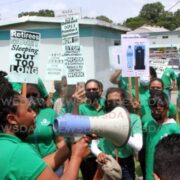Senator: Trinidad and Tobago must get Procurement law right
Black Immigrant Daily News
File photo: Senator Hazel Thompson-Ahye
INDEPENDENT Senator Hazel Thompson-Ahye said the very future of TT depended on the Joint Select Committee (JSC) on Finance and Legal Affairs “getting it right” in examining concerns over the enactment of the partly-proclaimed Public Procurement and Disposal of Property Act 2015. She chaired a JSC virtual sitting on Friday which examined Procurement Regulator Moonilal Lalchan plus Ministry of Finance permanent secretary Jennifer Lutchman.
The senator said the public was viewing the “very, very, very important” sitting, with a keen interest in things being done properly,
“The future of our country, our citizens, depends on us getting it right.”
In her closing remarks two hours later she reiterated, “This is an extremely important act of Parliament and our very lives and livelihoods depend on us getting it right.”
Lalchan said a study found 10-30 per cent of a country’s spending was lost due to corruption, which for 20 per cent of $26 billion spent in TT equated to $5.2 billion.
“Think what we could do for the country – health care, schooling and infrastructure.
“We are in a good place to get the act proclaimed.”
He said the few outstanding issues were the act’s regulations, exempted services and the operationalising of a review board.
Health Minister Terrence Deyalsingh asked if the act would cover every recipient of public monies via a state grant or pension.
Lalchan replied that a strict reading of the law would suggest that, but however added, “We are dealing with procurement.”
Saying the OPR’s focus was not on individuals who get grants for things like flood relief, he said,”We don’t believe that’s the intention.”
Deyalsingh asked about “busy bodies” who might stymie the procurement system by judicial review and lawsuits reaching the Privy Council.
Lalchan assured, “Challenge proceedings are very restricted.”
Deyalsingh feared the act creating possible delays in his acquisition of life-saving equipment for patients in public hospitals. Lalchan replied, “The act shall not apply to medical emergencies.”
He hoped the act could be used as “a catalyst to change the society.”
Lalchan said someone may visit the OPR office to lodge a complaint or alternatively remain anonymous by using the OPR’s whistle blowing facility, administered by an organisation reassuringly located outside of TT. “It’s literally a Chinese wall,” he said of the whistle-blowing mechanism.
Thompson-Ahye said Lalchan was “well-prepared, armed and straining at the bit”, but asked his views on the judiciary’s concerns about the act.
He replied that regarding the OPR’s evidence gathering, the office would first ask a public body for information. Next, the OPR would not use any big stick but must apply to a judge in chambers for a court order to seek information. Lalchan said, “So there’s protection in the legislation to prevent an abuse of power by the OPR.”
Of the possibility of too many complainants overwhelming the law courts, he said any objection to a OPR decision first goes through the OPR, then to the Review Board and only then to the court if still required by that stage. Saying the OPR had held 325 consultations with stakeholders, he reckoned no more talks were needed.
“We need to get the act proclaimed; see how it works.” He said if any requests were then made to amend the act, these could be compiled and addressed.
Lalchan remarked, “Success for the OPR is not about how many people are behind bars; It is about compliance with the act.”
OPR head of legal Lindy-Ann Mitchell, in reply to Deyalsingh, said the OPR’s rules of evidence with be based on a balance of probabilities, while challenge proceedings will be more informal than law court procedures.
JSC member Keith Scotland asked if it would be more prudent to address the judiciary’s concerns before proclaiming the act, to which Lalchan said the OPR addressed all concerns.Scotland asked about any empirical study in TT (on corruption losses), but Lalchan said without full proclamation the OPR couldn’t track those statistics. He said the Prime Minister in January noted a need to make a severe dent in white collar crime, by digital transformation.
Replying to Scotland, Lalchan anticipated input from Attorney General Reginald Armour.
Deyalsingh asked if named charity getting State help could only hire a handyman registered at the OPR. Lalchan said yes. Thompson-Ahye asked if that provision protected the public from shoddy work, to which Lalchan replies yes.
The JSC questioned Finance Ministry officials on the readiness of state enterprises for the act’s proclamation.
Lutchman couldn’t say how many entities had their procurement processes examined by the ministry’s Central Audit Committee.
Thompson-Ahye said she now detected “a sense of hesitation” unlike that ministry’s previous enthusiasm, saying, “I’m perplexed.”
NewsAmericasNow.com






Leave a Reply
Want to join the discussion?Feel free to contribute!